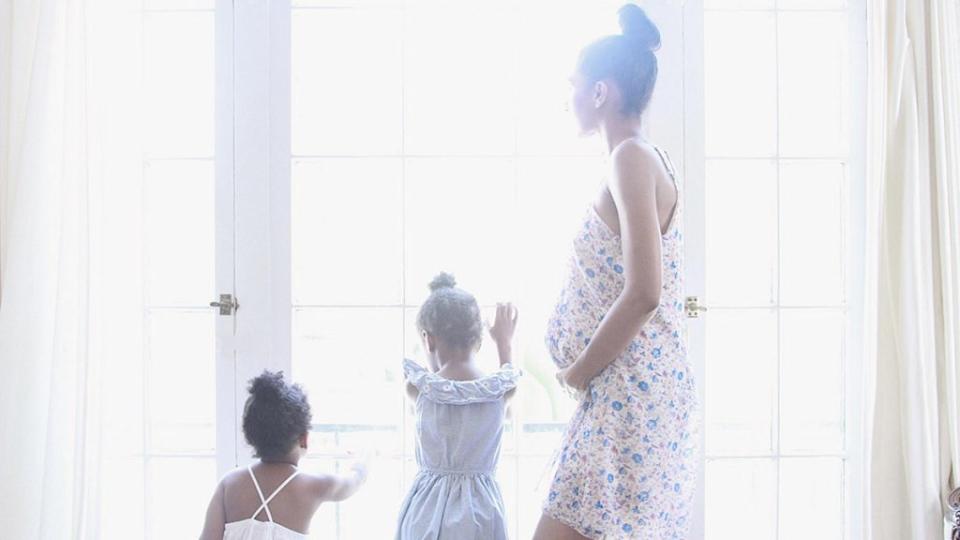How the Black maternal health crisis has affected me as a mom of 3
Lizzy Mathis is an In The Know by Yahoo parenting contributor. Check out her site, The Cool Mom Co., and follow her on TikTok and Instagram for more.
You’ve been waiting for this moment. The two lines finally appear. You take another test and the two lines show up again. You take in the moment. You are pregnant! The excitement sets in. The feelings of pure joy and anticipation for what’s to come overwhelm you!
Then you remember the reality. You are a Black pregnant woman in the United States. That stat from the CDC that you read a while back rings in your head like a panic attack: “Black women are three times more likely to die from a pregnancy-related cause than white women.”

Ten years ago, when I was pregnant with my first child, there wasn’t a Black Maternal Health week or any attention given to this problem. You heard about women dying during childbirth, but you thought it must have been some underlying condition or something rare. You definitely didn’t hear on the news about women dying during labor. Social media wasn’t big enough to hear it firsthand from your online community.
I was completely unaware of the public health crisis Black women were facing worldwide. When I embarked on my birthing journey, I did not know the risks. I walked blindly. No class I attended, no doctor or nurse I spoke with could have prepared me for what my fate could be — the fate that many Black families around the world had experienced.
Black Maternal Health awareness
Fast-forward to 2018, when the Black Mamas Matter Alliance created the first Black Maternal Health Week campaign. Their mission is to increase awareness about Black maternal health in the U.S. and to amplify community-driven policy, research and care solutions. The campaign has been popular on social media with women of all backgrounds, sharing their stories and showing support for others.
You finally began to hear shattering stories from the families of women who lost their lives during labor. A community was finally being heard, and on April 13, 2021, the White House officially recognized Black Maternal Health Week.
By the time I was pregnant with my third child, I had become more knowledgeable. As founder of the Cool Mom Co., a lifestyle site for women, I was fortunate to be connected with many mothers and parents. Over time, we’ve shared our experiences of the birthing process, each experience vastly different from the next and unique to every mother. But there was a common thread: Every woman I spoke with knew the importance of having a team of medical professionals they trusted and of having family, friends or doulas nearby.
One mom in Los Angeles told me she spoke up her entire pregnancy. Whenever she felt that something was “off,” she made sure everyone knew about it. Another woman in New York City told to me that her experiences with the medical personnel felt biased. She felt as if she was treated “differently,” and that her level of care was compromised from day one.
What she was feeling could be a common case of racial inequities. According to the Centers for Disease Control and Prevention, racial disparities exist due to multiple factors: “variation in quality healthcare, underlying chronic conditions, structural racism and implicit bias.”
Racial disparities in our health care systems can directly affect the outcome of birthing stories among Black women. While people are becoming more aware of the statistics around Black maternal mortality, the heartbreaking truth is “two in three [pregnancy-related deaths] are preventable.”
Finding support in the delivery room
I was in labor for 20 hours with my first child and quickly felt the benefit of having other trusted voices speaking on my behalf at all times. I was fortunate enough to hire a doula to help me prep for labor, be there during the birthing process and check in on my progress during my postpartum period.
Doulas are trained to provide guidance and support to pregnant women. They are your personal advocates in the medical community. As my husband and I navigated the birth of each of our three kids, having a doula on our team was invaluable. It was the greatest gift we could have given ourselves. There were times during labor when I had no idea what was happening and was definitely in no state to fight my own battles.
While having a trusted team is important, speaking up when you feel like something isn’t right is even more important. The CDC has outlined ways pregnant people and their families can help reduce factors that can lead to pregnancy-related mortality:
Talk to a health care provider about any concerns.
Seek immediate care if experiencing any of the urgent maternal warning signs, including severe headache, swelling of hands or face, trouble breathing, vaginal bleeding or discharge, extreme fatigue, and more. These symptoms could indicate a life-threatening complication.
Document and share pregnancy history during each medical care visit for up to one year after delivery.
Maintain ongoing health care and social support systems before, during, and after pregnancy.
Let’s speak up, share our stories, support our community and organizations, such as the Black Mamas Matter Alliance, to help end maternal mortality worldwide.
In The Know by Yahoo is now available on Apple News — follow us here!
The post How the Black maternal health crisis has affected me as a mom of 3 appeared first on In The Know.
More from In The Know:
Why is there a Black maternal health crisis?
How moms can advocate for themselves in the delivery room
Lenovo's newest and most advanced laptop is 60% off on Amazon for a limited time
Pregnant mom shuts down nasty TikTok comment: 'Why are we so obsessed with the number on the scale?'

